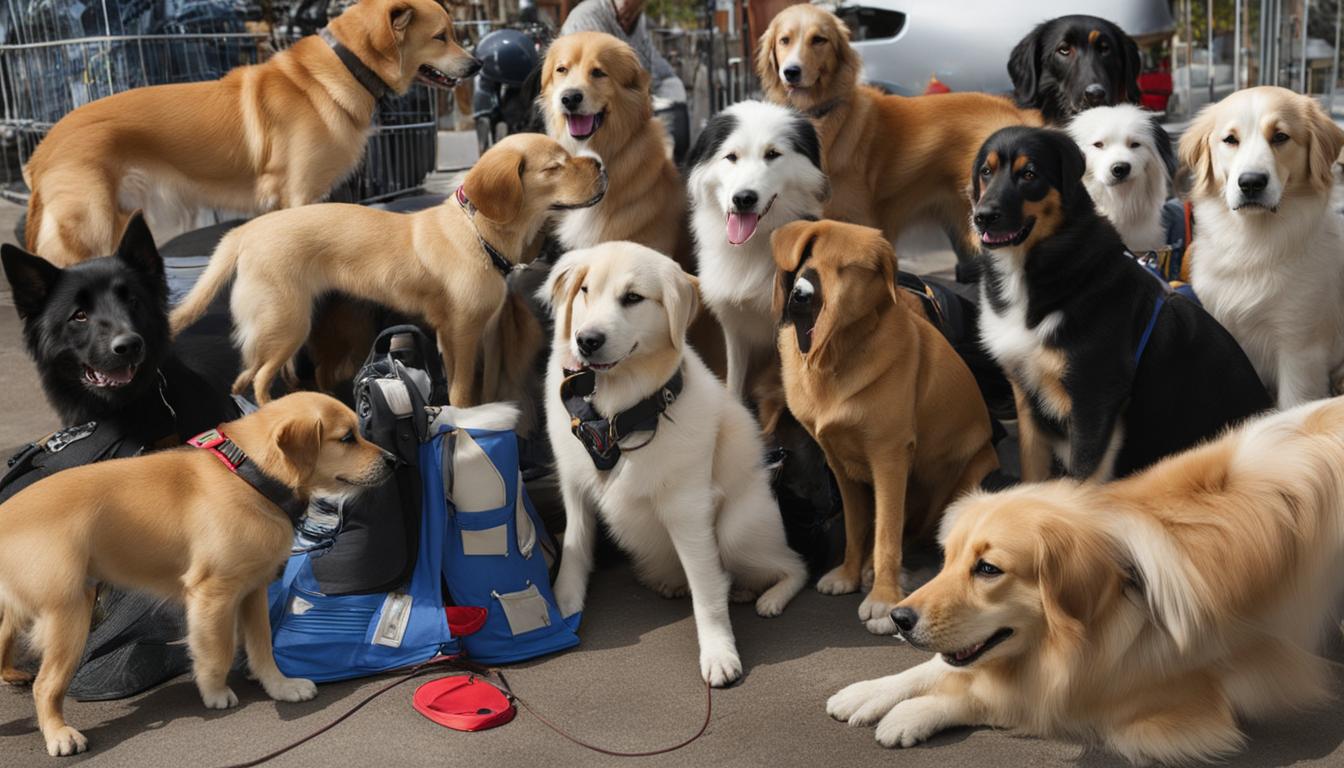Welcome to our article series on Ethical Dog Breeding and Adoption! In this first section, we will explore the importance of promoting responsible dog breeding and adoption practices. We believe that by raising awareness and advocating for ethical breeding, we can create a better future for both dogs and their human companions.
At the heart of responsible dog breeding is the well-being of the dogs. Breeders who prioritize ethical practices aim to avoid breeding practices that may lead to health issues or compromised quality of life. This includes being mindful of the negative consequences of selective breeding, such as breeding brachycephalic breeds that are prone to breathing problems and other health issues.
Moreover, ethical breeders focus on breeding dogs for specific purposes, ensuring their well-being and fulfillment in their intended roles. Whether it’s herding dogs like border collies or service animals like Labs, responsible breeding practices consider the physical and mental needs of the dogs.
When it comes to adopting a companion animal, it’s essential to consider the potential risks and challenges. Life circumstances may change, and even with responsible breeding and careful selection of owners, there can be situations where individuals are no longer able to provide the necessary care for their pets.
To address this, we encourage individuals seeking a companion animal to consider adopting from a shelter rather than seeking out intentionally bred dogs. By adopting from a shelter, you not only provide a loving home to a dog in need but also help alleviate the overpopulation issue. Shelter dogs often possess breed-specific traits and preferences, ensuring you have diverse options when adopting.
Key Takeaways:
- Promote responsible dog adoption campaigns
- Raise awareness about ethical dog breeding practices
- Create initiatives for ethical dog adoptions
- Advocate for ethical dog breeder awareness
- Support campaigns for responsible dog adoption
Guidelines for Responsible Dog Breeding
Responsible dog breeding is an important aspect of promoting ethical dog adoption and ensuring the well-being of dogs. If you’re considering becoming a breeder, it’s crucial to adhere to guidelines that prioritize the health and happiness of both the parent dogs and the puppies. Here are some key guidelines to follow:
1. Understand Breed Standards:
Before breeding dogs, it’s essential to have a deep understanding of the breed’s standard. This includes knowing the ideal characteristics, structure, and temperament of the breed. By familiarizing yourself with these standards, you can make informed decisions when choosing mating pairs.
2. Prioritize Health Screening:
Responsible breeders prioritize the health of their dogs by conducting thorough health screenings. This includes genetic testing to identify potential inherited disorders and regular veterinary check-ups to ensure general health requirements are met. By prioritizing health, you can help prevent the transmission of genetic diseases and promote healthier litters.
3. Provide Excellent Animal Welfare:
During the breeding process, it’s crucial to provide excellent animal welfare to both the breeding dogs and the puppies. This includes providing a suitable housing environment, proper nutrition, regular veterinary care, and appropriate socialization for the puppies. By ensuring good animal welfare, you can foster healthy and well-adjusted puppies.
4. Retire Breeding Dogs:
Responsible breeders understand the importance of a good quality of life for the breeding dogs. Once they are no longer producing litters, it’s essential to retire them to loving homes where they can enjoy their golden years. This ensures that the breeding dogs are not continuously subjected to the breeding process and can live happy, fulfilling lives.
5. Maintain Detailed Records:
Keeping detailed records is crucial for responsible breeders. This includes maintaining a clear lineage of the dogs, tracking the health and well-being of both the parent dogs and the puppies, and documenting any relevant information. By maintaining accurate records, you can ensure transparency and accountability in your breeding practices.
| Guidelines for Responsible Dog Breeding |
|---|
| Understand Breed Standards |
| Prioritize Health Screening |
| Provide Excellent Animal Welfare |
| Retire Breeding Dogs |
| Maintain Detailed Records |
Conclusion: Promoting Ethical Dog Breeding and Adoption for a Better Future
Promoting responsible pet adoption campaigns and raising awareness about ethical dog adoption is essential for ensuring the well-being of dogs and creating a better future for them. By supporting responsible breeding practices and advocating for adoption, we can make a significant impact on the lives of both dogs and their owners.
Responsible breeding practices prioritize the health and welfare of dogs, avoiding the negative consequences of selective breeding. This includes breeding dogs for specific roles, such as working dogs, and ensuring their well-being and fulfillment in these roles. Moreover, it emphasizes the importance of finding suitable homes for companion animals and considering the potential risks and challenges associated with owning a dog.
When it comes to adopting a dog, choosing to adopt from a shelter is highly encouraged. By doing so, you provide a loving home to a dog in need and contribute to addressing the overpopulation issue. Remember, shelter dogs can possess breed-specific traits and preferences, so don’t feel limited in your options when adopting. The focus should be on finding a dog that fits your lifestyle and can thrive in a safe and loving environment.
Educating the public about ethical dog breeding and adoption is key to promoting responsible pet ownership. By raising awareness, we can ensure that more people make informed decisions when it comes to acquiring a dog. This ultimately leads to a better life for dogs and a more fulfilling experience for their owners.





